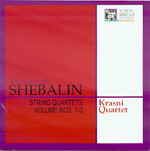Vissarion Shebalin (1902 – 1963) was an esteemed professor at the Moscow Conservatory, where he taught composition to Edison Denisov and Sofia Gubaidulina among others before becoming the director there in 1942. Shebalin was labeled a ‘formalist’ by Soviet Officials (along with Shostakovich and Prokofiev) in 1948, and due to his brazen criticism of party polices, was forced to resign his post. (The affair left him with a circulatory disease that paralyzed his right hand, forcing him to compose left-handed.) Shebalin’s voluminous output includes a large number of chamber works, including nine string quartets, the first three of which are presented here. String Quartet No. 1 (1924) reveals Shebalin’s “enthusiasm for the French” in its clear hints of Debussy and Ravel. Shostakovich comes easily to mind in String Quartet No. 2 (1935), particularly the irony tinged waltz section of the second movement. Moving on to String Quartet No. 3 (1939), we find Shebalin emulating the tart lyricism of that other great Soviet master Sergei Prokofiev. All three works are handsome crafted, revealing a prodigious compositional talent. The Krasni Quartet, obviously relishing the task at hand, deliver themselves of some highly enthusiastic and committed playing. Recorded by MHS in big, reverbant sound, this disc invites you to sample Shebalin’s interesting, if decidedly non-cutting edge music.
































